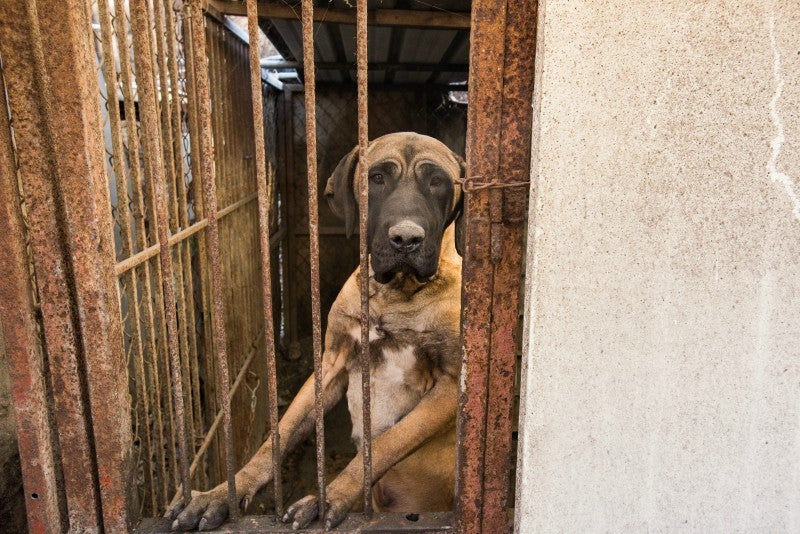
Update: On January 9, 2024, South Korea’s National Assembly voted through a ban on the dog meat industry, making the breeding, slaughter and sale of dogs and dog meat for human consumption illegal from 2027.
The dog meat industry in South Korea
In South Korea, dogs are intensively farmed for human consumption, often kept in appalling conditions. They are only provided with minimal food and water, housed outdoors in small cages without protection from the scorching summers or freezing winters. Many dogs suffer from disease and malnutrition, enduring daily neglect. The methods used to kill them are exceptionally cruel, with electrocution being the most common practice.
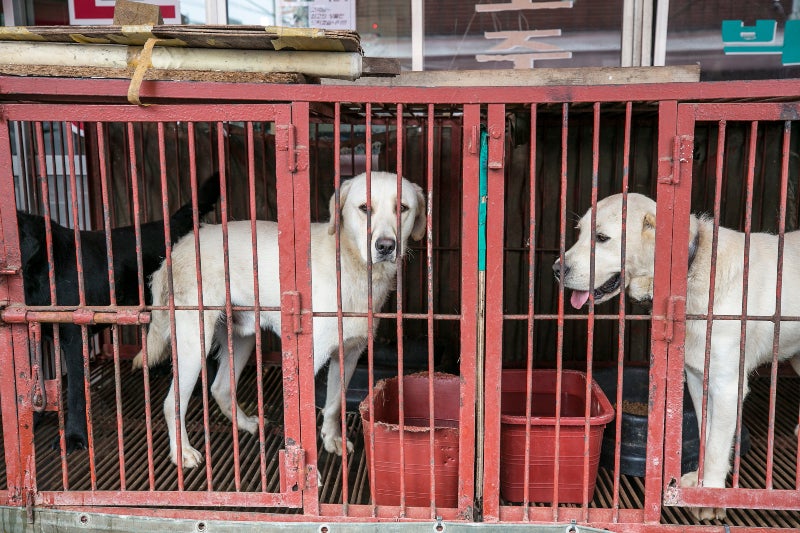
However, the majority of South Koreans do not regularly eat dog meat. It is primarily consumed by older men, who hold the mistaken belief that it offers health benefits. Dog meat is traditionally eaten as a soup called boshintang, which some believe invigorates the blood and combats lethargy, or as gaesoju, a tonic sold in traditional medicine shops. Consumption of dog meat is most common during the summer months, especially during Bok Nal, the three hottest days between July and August, when 70 to 80 percent of dog meat is eaten.
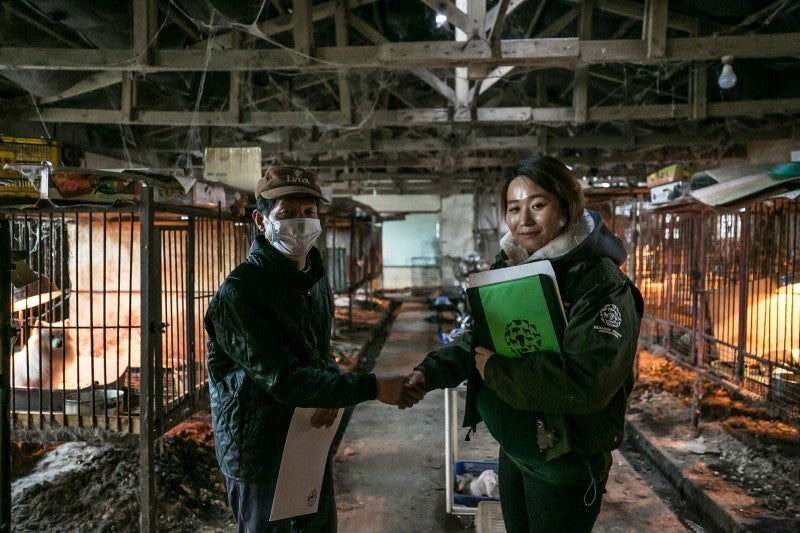
Models for Change: Closing dog meat farms
HSI works collaboratively with dog meat farmers who wish to leave the industry but lack the resources to do so. We sign legally binding contracts with farmers, committing them to permanently close their operations. The dogs are voluntarily handed over to HSI. HSI also supports the farmers in transitioning to more humane and profitable businesses, such as medicinal herb or fruit and vegetable farming. This cooperative approach has helped HSI demonstrate to the South Korean government that the dog meat industry can be phased out with farmer participation rather than opposition.
Since 2015, HSI has worked directly in South Korea to shut down 18 dog meat farms and rescue more than 2,500 dogs who have found loving homes in the United States, Canada, the United Kingdom and the Netherlands. A small number have found homes in South Korea.
These closures are a vital part of HSI’s broader strategy, which ultimately led to legislative action being taken aimed at phasing out dog meat farming in South Korea by 2027.
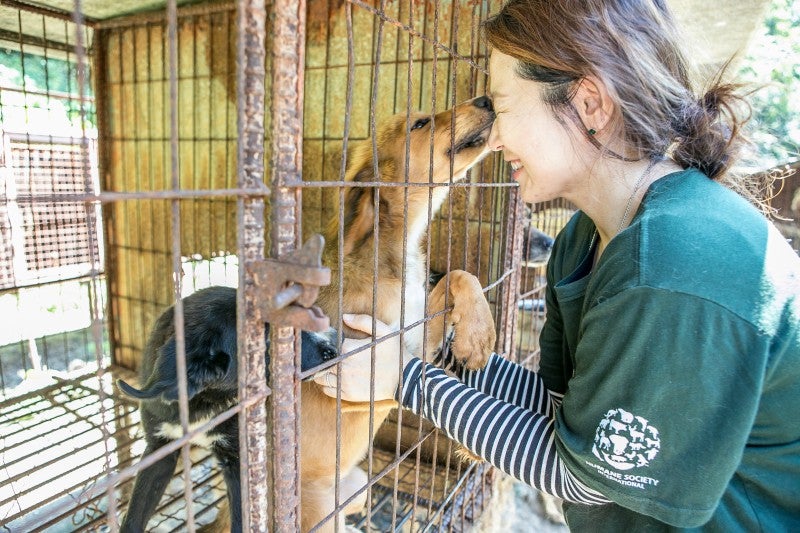
Our broader campaign
HSI/Korea works on the ground with local organizations and activists to create culturally sensitive solutions that will change public perceptions. Many people in South Korea love and keep pet dogs. However, there is a misconception held by some that “meat dogs” are different from “pet dogs.” We are slowly changing this perspective by showcasing countless adoptions of former “meat dogs” into loving families. Our campaign shows the public that all dogs suffer in the same ways and are all deserving of love. Another goal of our campaign is to encourage pet adoption. At present, there is insufficient widespread acceptance of dog adoption and shelters in South Korea are overcrowded.
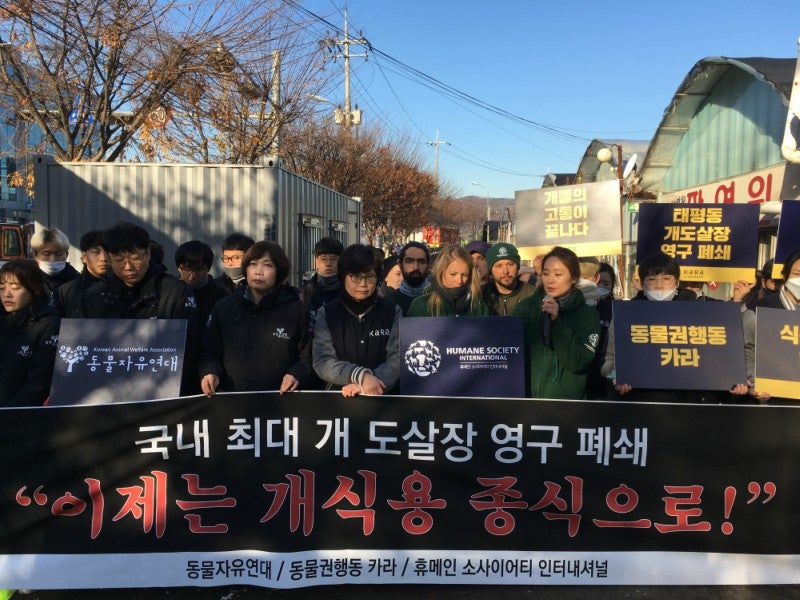
Progress
After almost a decade of campaigning by HSI/Korea and local groups, on January 9, 2024, South Korea’s National Assembly passed legislation banning the dog meat industry. This law, set to take full effect in 2027, makes the breeding, slaughter and sale of dogs for human consumption illegal. During the phase-out period leading up to 2027, HSI/South Korea will continue its work on the dog meat trade focusing its efforts on increasing public support for the ban, advising the government on dog welfare in relation to the dogs still on the farms, and conducting dog rescues to help highlight the ongoing plight of animals still trapped in this cruel industry.
